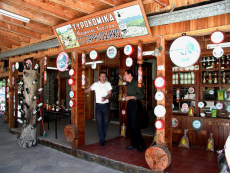
One of the most common opportunities to use your Greek is in a shop (or restaurant) environment, as it almost forces you to make conversation with a local in order to get what you need. In many Greek restaurants, the menus will be in English too, but challenging yourself to read the Greek one is always a bit of fun. So let’s try and ask for something in Greek.
Θέλω να αγοράσω = The-lo na agor-a-so = I want to buy
Θα ήθελα = Tha ee-thela = I would like
Αυτό = Afto = This
εκείνος = Ek-ee-nos = That
παρακαλώ = Parakal-o = Please
ευχαριστώ = Efharist-o = Thank you
Πόσο κάνει αυτό; = Po-so ka-nee afto = How much is this?
Πόσο κοστίζει; = Poso kosti-zee = How much does it cost?
Είναι (δέκα) ευρώ. = Ee-nay (thayka) ev-ro = It’s (ten) Euros.
Το λογαριασμό = To logarias-mo = The bill
Ένα = Ena = One
Μια = Mia = A
Some everyday items will be listed in the next lesson, which will be a vocabulary list. It’ll help you to ask for things you would commonly ask for when abroad, such as food at the marketplace. Don’t worry if you don’t get it right – the Greeks are very friendly people and will be delighted if you try.
Now it’s time to put your knowledge to the test. Eleni has gone into a café. See if you can work out what Eleni and Kostas are saying.
Ελένι: Γειά σου Κώστα.
Κώστας: Γειά σου Ελένι. τι κάνεις;
Ελένι: καλά, ευχαριστώ. Θα ήθελα ένα καφέ, παρακαλώ. Πόσο κοστίζει;
Κώστας: εντάξει. Ένα ευρώ, παρακαλώ.
There might be a couple of challenging words in there that we haven’t learnt yet. It helps to look at the whole sentence the word is in, as it gives you the context, and so can help you to work out what the missing word is.
Let’s see if you were right. Here is the translated version.
Eleni: Hello, Kostas.
Kostas: Hello, Eleni. How are you?
Eleni: Good, thank you. I would like a coffee, please. How much does it cost?
Kostas: Okay. One euro, please.
This form of conversation can be used in both restaurants and shops, only in restaurants instead of immediately saying “Πόσο κοστίζει;” immediately after asking for what you want, you would wait until the end of the meal and say “Το λογαριασμό, παρακαλώ”. This means “The bill, please”. You’d still say “Θα ήθελα” or “Θέλω” to ask for something.
So, the next lesson will give you an extensive vocabulary list, which will help you build on the knowledge you’ve already gained. Until then, though, look over previous lessons and make sure you’ve got a handle on it all so far – you don’t want to proceed to the next stage not fully understanding the first stage. The first stage is absolutely crucial, because things you learn here will keep cropping up as you progress, so if you haven’t mastered it yet, having to learn it all over again later on will be a real pain.
Image from: http://nixpixmix.blogspot.co.uk/2012/06/more-traditional-greek-shop-signs.html

0 Comment:
Be the first one to comment on this article.